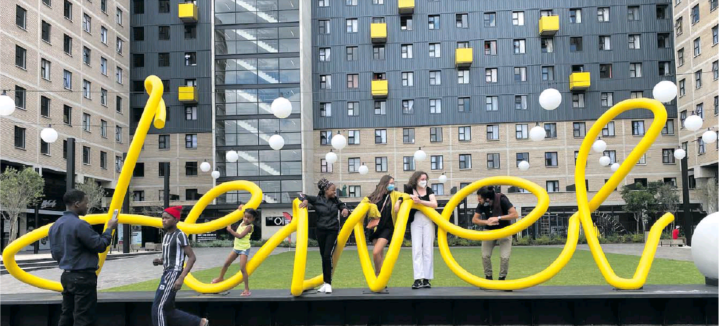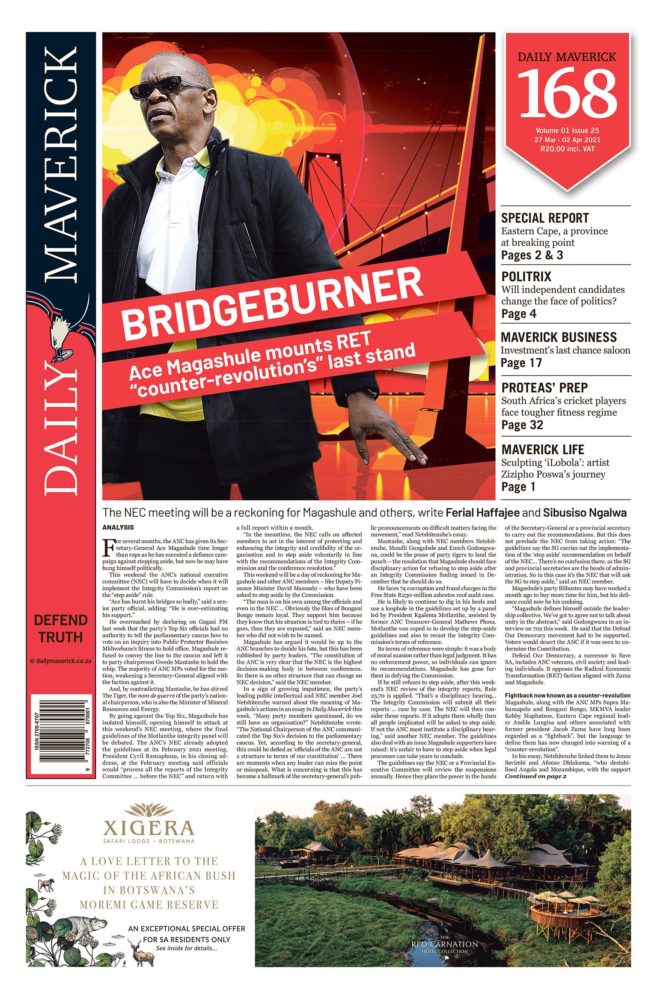BUSINESS MAVERICK 168
The gemstone in Jo’burg’s inner-city crown: First it was Maboneng and, now, it’s Jewel City

There’s a sparkling new gemstone in the City of Gold’s crown - a new development that is bringing hope to the inner city.
First published in the Daily Maverick 168 weekly newspaper.
Residents of Johannesburg are usually divided along clear lines with regard to their affections for the city. Some love it with a passion, while others entertain a love-hate relationship with the inner workings of the City of Gold. However, despite the increasing number of potholes and overgrown pavements that characterise Jo’burg’s infrastructure, now and again there seems to be news of a development that causes the doubters among the investors to give the city the proverbial second chance. First it was Maboneng, and now it’s Jewel City.
Crossing the road from the Maboneng retail precinct to Jewel City on foot is a bit like entering one of the then recently completed London Docklands developments. Only launched in September 2020, it is a pedestrian precinct, clean, colourful, spacious and contemporary in design.
There was a similar positive vibe around Maboneng when it launched roughly 12 years ago. As financial commentator Sinesipho Maninjwa wrote in a 2019 Biznews article, “Maboneng was the fruit of (the young investor, Jonathan) Liebmann’s labour. It attracted investors, trendy galleries and artisanal shops and, in a nutshell, became a shining example of how property development can combat urban decay.”
However, Liebmann’s company, Propertuity, ultimately collapsed. It was a tale of various challenges, including corporate governance and personalities, and accommodation offerings not speaking to the correct market – people who worked in town.
With the pedestrianised Jewel City, however, it appears as though the investors may have arrived at a model for inner-city development success. It is a physical continuation of the Maboneng Precinct, which is a perfect fit for the pedestrianised younger sibling across the road.
Live, work, play
Carel Kleynhans, CEO of Divercity Urban Property Fund, which is responsible for the development of Jewel City, speaks with pride about the “work, live, play” concept that his company has crafted in its development. “We believe in the fundamental value of living close to where you work. The Johannesburg inner city remains a major employment node of southern Africa and is also physically right in the middle of greater Johannesburg, with excellent access to transport. As such it remains very well located, especially for households who do not have private cars.”
Kleynhans says that Divercity, joint-owned by Atterbury Group, Ithemba Property, Nedbank Properties and RMH Property, has so far invested R1-billion in the Jewel City development. Divercity announced in October 2018 that it would be spending R2-billion on Jewel City.
“Contrary to widely held beliefs, there are many South Africans who value a city lifestyle of living within walking distance of amenities,” says Kleynhans. “Maboneng (across the road from Jewel City) still offers this and remains a popular place…”
Maboneng continues
Indeed, the Maboneng Precinct has seemingly morphed in purpose. From being a weekend outing for tourists and visitors from Jo’burg’s northern suburbs and beyond seeking food and arts, it now appears to be an attraction for locals, many of whom will live in Jewel City.
Arts on Main, a heritage building and the first Maboneng Precinct revamp, was home until 2018 to a food market and art and fashion boutique stores. While it is ghostly quiet inside today, a few quality shops and stalls on the Fox Street periphery of the building keep a sense of life and business alive.
“Maboneng has changed, but it doesn’t need to be resurrected,” says Kleynhans. “If anything there are more people in Maboneng now than ever.” Kleynhans’s office is a five-minute walk from Maboneng’s Arts on Main, in Jewel City itself, far from Sandton, where one might expect a booming property fund to position itself.
According to its website, Divercity is a for-profit property fund that is setting a new standard for socially responsible, environmentally sustainable and economically productive urban development, while delivering attractive returns for its institutional investors.
A national imperative
Paul Jackson, CEO of the Braamfontein-based Trust for Urban Housing Finance (TUHF), a specialised commercial property financing company that finances property investors exclusively in inner cities, says urban densification is a national imperative.
“It is happening as part of a natural demographic trend that happens as countries develop,” Jackson says this densification is happening at a much larger scale than people may believe. “According to the Centre for Development and Enterprise, 70% of South Africa’s population will be urbanised by 2030, with more than 60% urbanised already.”
In a word of warning, he says the current approach to urban development and housing investments “has contributed to enormous and unsustainable urban sprawl”, as people flock to urban areas and inner cities. Jackson speaks of the need to manage urban densification carefully, in order to avoid creating urban decay in the process.
Urban sprawl and improvement
Evidence of such warning is found in the hijacked buildings and decay evident when driving through the Jo’burg city centre en route to the six Fox Street blocks that play host to the “pristine” Jewel City.
Kleynhans says they are working with the Johannesburg Development Agency (JDA) to continue the pedestrianisation of Fox Street between Jewel City and Absa, and to connect to the recently upgraded Main Street link between Absa and Gandhi Square.
“I believe a contractor has already been appointed by the JDA and works are expected to commence soon,” he says.
“The City of Johannesburg, across administrations, has been very supportive of the kind of development we do. Our primary engagement with the City is through City officials, who are not political appointees but rather career public sector professionals.”
The oOfice of the Executive Mayor of Johannesburg, Moloantoa Geoffrey Makhubo, stresses the important role the business community has to play in helping the city to attain the goal “of an economically prosperous, safe and liveable City of Johannesburg”.
Key to the City’s constructive relationship with Divercity is the latter’s commitment to addressing past legacies and iniquities, in line with the City’s own commitments. When asked about envisaged return on investment (ROI), Kleynhans’s answer is telling.
“While we deliver market-related return on equity for our shareholders, we also measure ROI in the form of the significant contribution our business model is making towards the undoing of apartheid-era spatial segregation, improved overall sustainability and access to high-quality, empowering living environments for our tenants.”
A different view
However, Jo’burg city property investor Gideon Mendel, whose property investments are just a few streets away from the precincts, disagrees that the City has the business community’s interests at heart, with security and basic services just two of his primary concerns. Mendel first invested in Jo’burg’s inner city in about 2002, focusing on the City and Suburban area west of what became known as the Maboneng Precinct.
“It was considered high risk, high reward,” he says, adding that in the last five years the cycle had started to reverse.
“My returns started dropping,” he says, adding that investors who look to invest in the city with the hope of establishing a good public-private partnership with the City are being let down.
“There is no consistency in security, sewerage, lights and water, and as a result rentals are going down,” says Mendel. “The City is killing our business model …”
Speaking to these concerns, Mayor Makhubo confirms that City Power has revamped and maintains the street lights to ensure safety at night, rating its performance “at about 75%”, attributing the shortfall to damage to poles by third parties and theft of aerial bundle conductors. He refers to “intelligent-driven and proactive operations … conducted on a daily basis to ensure safety and security, joint operations with other law enforcement agencies and static deployments … to counter street robberies, prostitution and vehicle-related crimes including business robberies”.
Makhubo speaks of a “24/7 Undercover Unit” apparently at work in the area, with foot patrols and stop-and-search operations conducted in daylight hours. The “area” referred to could be crucial here, as the mayor speaks of the Maboneng Precinct being in Ward 61, “a vibrant area of the CBD”, with anything outside of it possibly being excluded from the special treatment described.
Two-weekend visits over four weeks revealed a visible private security presence in the Jewel City precinct, but no SAPS.
Mendel also speaks of his concern about slumlords. “There are some good builds in the city, but the problem is they have slums next to them.” David Mayers, MD of Quorum Holdings, one of the early investors in Propertuity and with a passionate belief in downtown Johannesburg, echoes his concerns.
“What is Jo’burg without potholes and hijacked buildings?”
Makhubo says Metro police officers who come across “bad buildings and dilapidated buildings” on patrol have instructions to report them to the “regional director’s office and Group Forensic and Investigation Services for further investigations”.
Evidently the Quorum MD requires more convincing, as he says he finds doing business in downtown Johannesburg challenging. “Anything City-related is a struggle, unfortunately… (Former mayor) Mr Mashaba was a breath of fresh air. His interest in the revitalisation of the inner city was evident in his and his team’s approach to developers.”
Regardless, Mayers has R800-million invested in the city, with R500-million in the Maboneng and City and Suburban area itself, and he’s not taking his money anywhere.
“There will always be a need for the Jo’burg CBD. Its location and superior transport networks will always render it as having a place in the larger city landscape. We have invested heavily, and continue to do so.”
Kleynhans says Divercity would “welcome a stronger City in terms of service delivery”, yet says he’s confident his company can work with the City “to continue delivering an excellent urban environment in and around Jewel City …”
A win for all, in Mayers’ eyes, “would be to see the various stakeholders – banks, city council – acknowledge the CBD and the developers who play within it as key to its ultimate turnaround”.
Discussing the Central Johannesburg Partnership’s plans in the mid-1990s to restore Johannesburg’s inner city, I ask Mayers why he feels it hasn’t happened.
“There have been pioneers, like Mr Olitzky, Afhco and Ithemba, who have had great success. I think the issue with this ‘vision’ is one must appreciate the sheer scale of the Jo’burg CBD. Look at Jewel City, R2-billion but a mere blip on the map.”
TUHF’s Jackson pares it down to the bare essentials.
“People are already investing in inner cities, financing … urban development to create urban densification projects … The market trend is extraordinarily positive, and for government and private investors, the opportunity lies in helping to ensure that these investments are regularised and contribute to inclusive wealth creation.”
Amid the urban squalor and potholes tearing up the downtown streets and pavements, in its funky Maboneng and slick downtown Jewel City precincts, Johannesburg — this time with finance and appropriate thought behind it — is once again offering a glimpse of what is really possible. DM168
This story first appeared in our weekly Daily Maverick 168 newspaper which is available for free to Pick n Pay Smart Shoppers at these Pick n Pay stores.



















Hmm… I for one won’t quickly invest in some developers get rich dream again. Maboneng burnt my fingers. Without a heavy buy-in from the City, which clearly is unable to run itself, these social engineering projects cannot succeed.